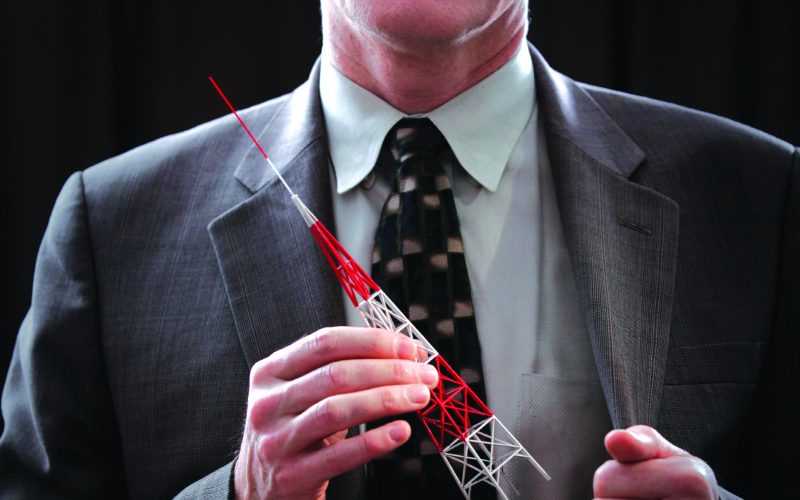
Photo By Terrah Baker Kyle Kellams of KUAF 91.3 FM records a “commercial” spot for Ozarks At Large, the community news segment aired daily.
By Terrah Baker
After 1996, something changed in the radio industry.
Filmmaker Kevin McKinney noticed the changes, as he watched one of his favorite local stations out of Lawrence, Kan., become a dying legacy of its previous self.
“Within a year after them being voted a top 10 station by Rolling Stone … they were sold and went to top 40. The entire music scene didn’t go away, it just began to fade,” McKinney said.
The station was known for playing the music of local, up-and-coming musicians, and it was something these artists counted on for a leg-up in the industry. After the station was purchased, and Whitney Houston replaced local bands, the new stage was set.
When he’d attend a Wednesday night show, McKinney said it was no longer the large crowds that were there before, but a few dedicated fans who followed the bands despite having no airplay or industry recognition.
“What was missing was not the music fans, but the people who went along to be a part of something,” he explained.
As the local music community lost its voice, the change began to take effect from within as well.
Small, local businesses could no longer afford advertising when competing with large companies like Coca Cola and Budweiser. DJ’s and radio personnel across the country lost their jobs, and the airwaves were filled with pre-recorded tracks, while radio stations sat empty. And community radio across the country lost its local voice, spirit and connection with listeners.
As a result, ratings began to plummet. Many listeners claim they lost their love for radio, and began putting in their CD’s and subscribing to satellite radio, or the latest streaming device.
The corporations buying these local stations from the moms and pops who previously owned and ran them made money at any cost. And it wasn’t just the corporations. The banks that loaned millions of dollars to buyout thousands of stations across the country raked in the interest. Through creative accounting and business strategies, owning the radio became quite a profitable endeavor.
The Telecommunications Act of 1996, that eliminated the national cap on station ownership, made it all possible. Before that — since the 1930s — the government regulated how many stations could be owned by the same parent company. With these regulations gone, companies like Clear Channel, Bain Capitol and Cumulus owned a large portion of the airwaves, and began immediately to change the missions from community support and coverage, to national conformity with hit songs and large advertisers.
McKinney’s documentary Corporate FM (2012), explores this issue in depth. By bringing the film and McKinney to Fayetteville, local activists hope to spread the word about a project currently underway across the nation and in Fayetteville to bring community radio back to the airwaves.
Although Fayetteville retained community radio stations like nonprofit KUAF 91.3 FM, changes occurred locally as well, according to 33-year radio veteran Kyle Kellam, who started full-time at KUAF in 1989.
“I think you saw a big reduction in local programming. For a long time you couldn’t find Fayetteville high school sports on the radio. In some areas they would lose high school sports and it was because the powers that be far, far away said ‘no, we’re not spending money on that,’” he explained.
Today, out of 23 stations throughout Northwest Arkansas, Cumulus directly owns six and Clear Channel four.
A group headed by Fayetteville resident Joe Newman is looking to add to the total number, by bringing back a community radio station solely devoted to Fayetteville happenings, personalities and ideas.
In 2011, Obama signed an act that will allow local nonprofit organizations to obtain low-frequency stations for no cost. With this initiative, Joe Newman of the Fayetteville Community Radio group, supported by the Omni Center for Peace, Justice and Ecology of Fayetteville hope to gain the momentum necessary to win a bid for one of these stations.
“The possibility is that thousands of new stations can be on the air. Like here in Arkansas, almost every rural community that had enough people to man a station or care about it could easily get a station because there’s so many frequencies available. And it’s free,” Newman said.
Kellam said he thinks the industry is ripe with opportunities for local radio, as people begin to realize it’s the only place they can hear about their own community.
“People are going to other devices for what they want to hear. But what you can’t get on satellite is local stuff. I think local sells, and there are people who want local stuff,” he said.
The Fayetteville station could potentially reach from 3 to 10 miles and be manned totally by local volunteers. Newman’s hope is with the 18-month window given to an organization once it wins a bid for a frequency, volunteers can gather the equipment necessary through donations and fundraisers. Then, they can begin to polish their work to sound professional and appealing, to give local musicians and those involved a chance to succeed.
The movie will show on Sept. 23 at 6:30 p.m. at the Omni Center in Fayetteville, with a presentation from Newman beforehand on how to get involved and how this project could benefit the community.
As the documentary shows, benefits of local radio go beyond profit, and bringing this ideal back is a challenge these activists are ready to face.











